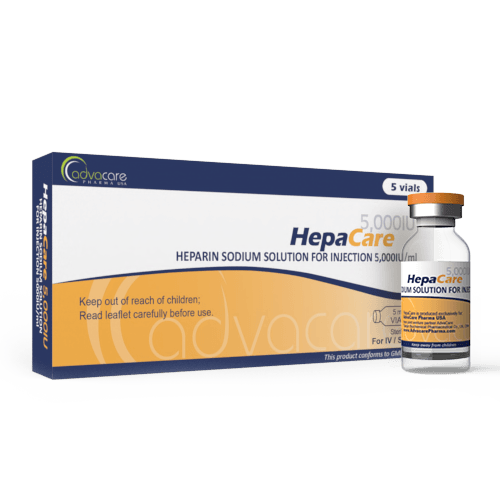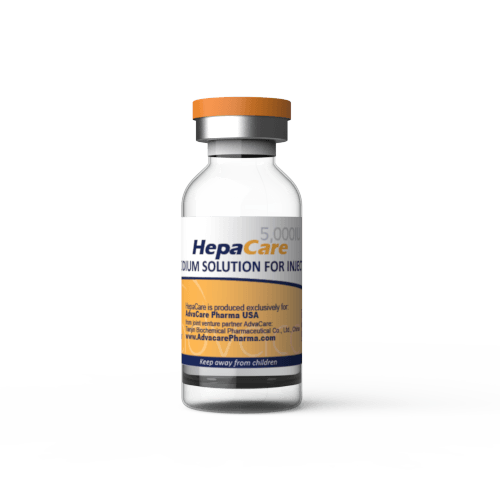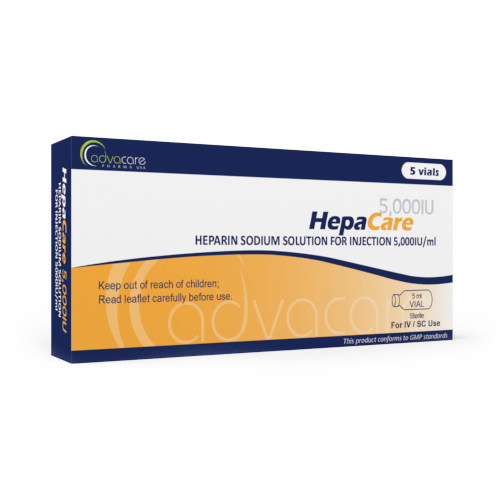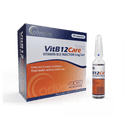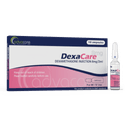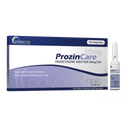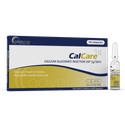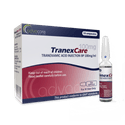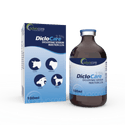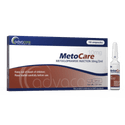- Home›
- Pharmaceuticals›
- Injections›
- Small Volume Injections›
- Heparin Sodium Injection
Heparin Sodium Injection
Dosage
Packaging
What is Heparin Sodium?
Active Ingredients: Heparin Sodium
Heparin Sodium Injection is a blood thinner that is used for the prevention and treatment of blood clots, such as deep vein thrombosis and pulmonary embolism. This anticoagulant drug is also used to treat clotting-related conditions and disorders like disseminated intravascular coagulation.
Heparin sodium is typically administered in a hospital for urgent situations. It works quickly, but it is imperative to monitor a patient's bleeding risk through blood tests. This medication is also the first-choice treatment for pregnant women, as heparin does not affect the fetus.
Heparin Sodium is classified as an anticoagulant or antithrombotic drug. It is a naturally occurring glycosaminoglycan that works by blocking the action of blood-clotting proteins within the blood. This activity prevents blood clots.
AdvaCare Pharma is a trusted manufacturer and global exporter of Heparin Sodium Injections. These injections have been manufactured in our state-of-the-art facilities situated in China, India, and the USA. Our extensive product line includes a wide range of high-quality and cost-effective medications and medical supplies that are available for distribution.
Why are we a leading Heparin manufacturer?
AdvaCare Pharma, a US-owned pharmaceutical company, is a manufacturer of Heparin Injection with GMP-compliant manufacturing facilities located worldwide. We conduct frequent GMP, third-party and internal facility inspections to ensure that our manufactured injectable treatments exceed the stringent requirements of importing countries and our distributors.
As a renown Heparin manufacturer and global supplier of 120+ pharmaceutical injection products, our global reach extends to over 65 markets ensuring that pharmaceutical distributors, hospitals, pharmacies, NGOs and government institutions receive the quality-assured treatments they need.
Uses
What is Cimetidine used for?
It is used to treat ulcers, gastroesophageal reflux disease (GERD), and other conditions caused by too much stomach acid.
This drug is used to reduce gastric acid secretion and can help in the treatment process of the following:
- Duodenal ulcers
- Non-malignant gastric ulcers
- Gastroesophageal reflux
- Zollinger-Ellison Syndrome
- Systemic mastocytosis
- Multiple endocrine adenomas
It is also used for prophylaxis of recurrent gastric or duodenal ulcers. It is used as adjunctive therapy in cystic fibrosis in children, but it should be used with caution and well-regulated dosages. It can treat NSAID-induced lesions and gastrointestinal damage.
How are Cimetidine Injections used?
This medication is manufactured as a solution to be injected into a vein or muscle. It is to be administered by a healthcare professional in the hospital or clinic setting. It should be injected slowly over at least 5 minutes. The dosage and the length of the treatment depend on the severity of the medical condition and the patient’s response.
What dose should be given?
The usual dose for adults is 200mg every 4 to 6 hours.
Refer to a doctor or pharmacist for guidelines on the exact dosage.
Can this drug be used during pregnancy?
Acid-suppressing drugs during the first trimester of pregnancy do not lead to significant teratogenic risks. Cimetidine belongs to the category B drugs in pregnant females, according to the FDA. Animal studies do not show a fetal risk. There are no adequate studies on humans during pregnancy regarding using Cimetidine.
Are there any dose recommendations?
Patients with a glomerular filtration rate of 10 to 50ml/minute should receive 50% of the normal dose. In older patients (older than 65 years), the dose should be lower to prevent the risk of mental status changes.
Are there any significant side effects of this drug?
This drug might have antiandrogen properties, which lead to feminization and sexual dysfunction in males.
Does Cimetidine have a teratogenic effect?
Animal studies show no evidence of impaired fertility or fetus side effects due to Cimetidine. There are no adequate human studies that can confirm the same in humans. This drug should be used with caution in humans and only when clearly needed.
Can Cimetidine be used in nursing mothers?
Cimetidine is secreted in the milk, and nursing should be stopped when the patient is being treated with this drug.
Is Cimetidine safe for pediatric patients?
Usage of Cimetidine is limited in pediatric patients. It is not recommended for patients under the age of 16 unless the physician suggests it. When prescribed to children, the dose should be adjusted depending on the patient’s weight. It should be added only if the benefits outweigh the risks.
Can immunocompromised patients use Cimetidine?
Immunocompromised patients treated with Cimetidine might have a decreased gastric acidity, and this increases the possibility of superinfections with Strongyloidiasis.
Is only Cimetidine enough to treat excess gastric acid issues?
It depends on the medical condition of the patient. Sometimes only this drug is enough for the treatment process. In severe cases, other medications should be added, and some conditions should be treated symptomatically.
Does Cimetidine have anticancer properties?
Abnormal cytokine expression patterns, potentially induced by the local production of histamine through H2 receptors, may lead to the suppression of tumor immunity. Both clinical and preclinical investigations have demonstrated the anticancer and antitumor properties of cimetidine. These effects are due to the inhibition of tumor cell adhesion, antiangiogenic activity, and the stimulation of the immune system. Surgery may diminish cellular immunity, and cimetidine treatment has shown the potential to mitigate this effect. This drug can lead to a survival advantage for cancer patients.
What should be done in cases of Cimetidine overdoses?
If a Cimetidine overdose occurs, the patient's respiratory and cardiovascular function should be monitored. The patients should get a symptomatic and supportive treatment that might include antiemetics. Gastric lavage should be performed in severe cases, and activated charcoal can significantly improve the patient’s health status.
Other warnings
This drug can elevate the serum creatinine levels in a high percentage of patients. This can be resolved if the treatment stops. Renal function should be evaluated before and during the treatment with Cimetidine, especially in patients with renal impairments.
Patients who have hypersensitivity reactions to this drug or other similar H2-receptor antagonists should not use this drug.
Gastrointestinal pathologies and drug toxicities from this drug include blood in the stool. Patients with previous serious gastrointestinal damage should be aware of this sign.
Bone marrow suppression might occur during the treatment with Cimetidine. Complete blood counts should be performed to detect any changes in the blood.
Overdoses of this drug are rare, but in cases of toxicity, the airway and cardiovascular status should be monitored carefully. Gastric lavage for a decontamination of Cimetidine is required in some cases. To reduce the drug absorption, activated charcoal should be given.
Side Effects
As with all pharmaceuticals, some unwanted effects can occur from the use of Heparin Sodium Injection.
Common side effects include, but may not be limited to:
- abnormal results on liver function tests
- unusual bruising
Serious side effects may include:
- unusual bleeding or bruising, including nosebleeds or blood in the urine or stool
- severe pain in the stomach or back
- excessive tiredness
- skin warmth
- chest pain and arrhythmia
- shortness of breath
- signs of an allergic reaction, including nausea, hives, or unusual swelling
- signs of a blood clot, including sudden numbness or weakness
For a comprehensive understanding of all potential side effects, consult a medical professional.
If any symptoms persist or worsen, or you notice any other symptoms, please call your doctor.
Precautions
Do NOT use a Heparin Sodium Injection if:
- You are hypersensitive or allergic to any of the ingredients.
- You have uncontrolled bleeding, a severe lack of platelets, or have had heparin-induced thrombocytopenia.
This medication may not be suitable for people with certain conditions, so it is important to consult with a doctor if you have any health conditions.
Before treatment, consult your doctor regarding any medications you are taking to address potential drug interactions.Certain drugs may increase bleeding risk, such as aspirin and NSAIDs like ibuprofen. Heparin sodium is contraindicated with defibrotide and mifepristone.
Some preparations of heparin sodium may contain sulfite or benzyl alcohol.
Do NOT use this medication to clean out an intravenous catheter.
References
Intragastric administration of heparin enhances gastric ulcer healing through a nitric oxide-dependent mechanism in rats
This is an animal study that evaluates the use of heparin in increased gastric ulcer healing in rats.
Heparin (100, 500, 1000 U/kg, i.g.) was administered once daily for 4 days to accelerate the healing of gastric ulcers induced by acetic acid in Sprague–Dawley rats. These rats had an increase in mucosal proliferation and regeneration at the ulcer margin, microvessel number both at the ulcer margin and base, and the thickness of the mucus layer.
This study demonstrates that heparin promotes the healing processes of gastric ulcers.

You might be interested in...
Why AdvaCare Pharma?
As an industry leader, we are aware of our responsibility to provide affordable and sustainable solutions to improve healthcare worldwide.
